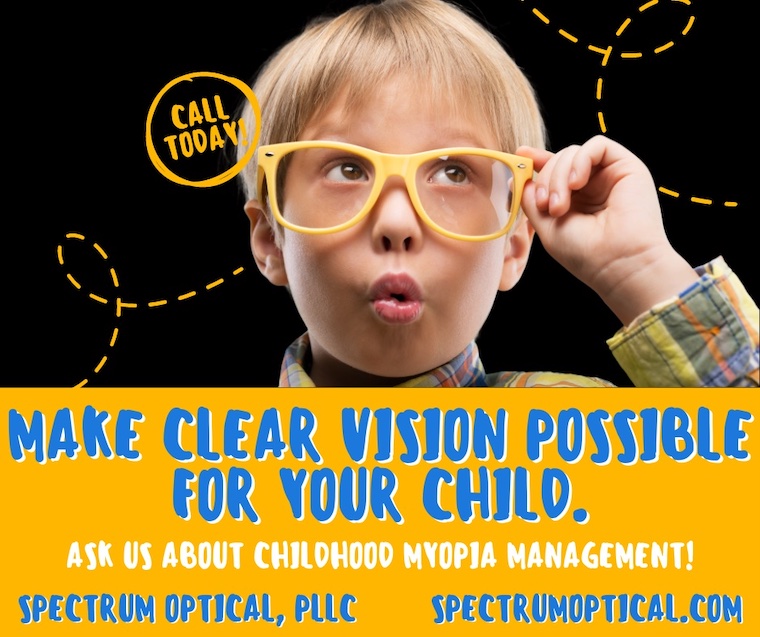Myopia Management
Slowing the progression of nearsightedness starts at Spectrum Optical.
Do you or your child have difficulty seeing distant objects?
Myopia (nearsightedness) typically starts to develop in childhood and often progresses until about age 20. People with myopia will experience blurry distance vision when they are not wearing their contacts or glasses.
Slowing the progression of myopia is important because it may reduce the risk of developing serious eye conditions later in life such as cataracts, glaucoma, retinal detachment, and blindness.
There are several treatment options to slow the progression of myopia. Schedule an exam with us to learn more.
Myopia is on the rise
Nearsightedness is a growing concern in the United States.
It is estimated that by the year 2050, roughly half of the world’s population will be affected by this eye condition.
Many researchers believe the rise can be attributed to more time spent staring at screens and less time outdoors.

Myopia management in children
Myopia (nearsightedness) can make enjoying everyday activities hard for children. Without intervention, myopic children may experience headaches, visual disturbances, and severe myopia progression. Delaying care could make matters even worse. With the inception of Cooper Vision’s new child-friendly contact lenses, myopia has met its match. MiSight 1-Day contact lenses have been clinically proven to slow the progression of myopia in children aged 8-12 at the start of treatment. This child-specific program allows our Optometrists to track myopia progression over time and delay the progression of this common refractive error. Ask our team about myopia management at your next visit!
How do you “control” myopia?
Determining an effective myopia control plan starts with a visit to our office. Schedule an appointment now.
There are a few main approaches to controlling myopia, including:
Multifocal contacts lenses
Multifocal contact lenses are special contacts that have different powers in different zones of the lens.
Researchers and eye doctors have found that multifocal soft contact lenses are also effective tools for myopia control in children. Some research demonstrates that using soft multifocal lenses in children caused a 25-50% reduction in progression over 2 years.
Orthokeratology (Ortho-K)
Ortho-k — also known as Corneal Refractive Therapy (CRT) or “corneal reshaping lenses” — is a non-surgical approach that helps to reshape the curvature of your child’s cornea using specially designed gas-permeable contact lenses.
Ortho-K contact lenses are only worn during sleep at night and are used to temporarily correct mild to moderate myopia symptoms.
Evidence suggests that nearsighted children who undergo several years of orthokeratology may end up with less myopia as adults.
Atropine eye drops
Topical atropine is a medicine used to dilate the pupil and temporarily relax the eye’s focusing mechanism and has been used in myopia control for years.
Several studies show that low-dose atropine helps to reduce the progression of myopia in children, especially when combined with Ortho-K lenses.
If you’d like to learn more about myopia control, request an appointment at Spectrum Optical today.
